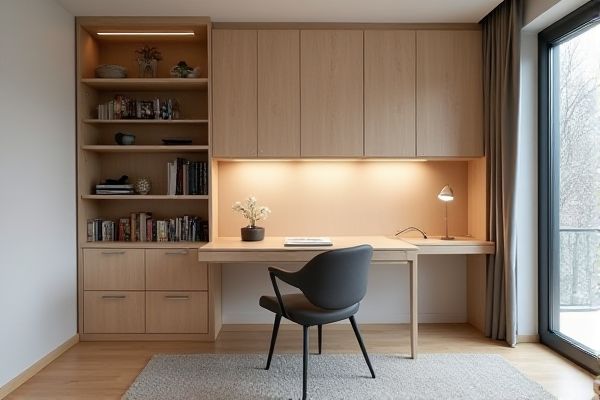
Murphy desks save valuable floor space by folding up against the wall, making them ideal for small rooms or home offices, while folding desks offer portability and easy storage for temporary setups or multipurpose spaces. Explore the rest of the article to discover which desk best suits your needs and lifestyle.
Table of Comparison
| Feature | Murphy Desk | Folding Desk |
|---|---|---|
| Design | Wall-mounted, folds vertically | Portable, folds flat horizontally |
| Space Efficiency | Maximizes floor space, ideal for small rooms | Compact, easy to store and move |
| Installation | Requires wall installation | No installation needed |
| Weight Capacity | Generally higher, supports heavy equipment | Varies, typically lighter load |
| Portability | Fixed location | Highly portable |
| Price Range | Moderate to high | Low to moderate |
| Use Case | Permanent workspace, home office | Temporary use, flexible setups |
Introduction to Murphy Desks and Folding Desks
Murphy desks are space-saving furniture pieces that fold up against the wall, providing a seamless workspace when needed and freeing floor space when not in use. Folding desks feature collapsible legs or surfaces that can be easily folded down for portability and storage in compact areas. Understanding your space requirements and usage patterns will help you choose between the sturdy, wall-mounted Murphy desk and the versatile, portable folding desk.
Key Features of Murphy Desks
Murphy desks are designed with space-saving functionality, featuring a fold-down work surface that seamlessly tucks away into a wall-mounted cabinet, ideal for maximizing small rooms. These desks often include built-in storage compartments or shelves, providing organized space for office supplies and reducing clutter. Your ability to transform an entire room instantly supports versatile living and working environments compared to the simpler, more portable folding desks.
Essential Characteristics of Folding Desks
Folding desks are characterized by their portability, space-saving design, and ease of storage, making them ideal for small living areas or temporary workspaces. Unlike Murphy desks, which are mounted on walls and fold vertically into cabinets, folding desks typically have collapsible legs and a flat surface that can be quickly set up and packed away. Their lightweight construction and versatility suit flexible office setups, while Murphy desks provide a more permanent, integrated solution.
Space-Saving Benefits Compared
Murphy desks maximize space efficiency by folding vertically against the wall, freeing up floor area when not in use, making them ideal for small rooms or apartments. Folding desks also save space but usually fold horizontally or collapse partially, which may require more clearance and limit placement options. Your choice depends on how much space you can allocate and whether you prefer a sleek, wall-mounted design or a portable, flexible desk solution.
Installation and Setup Differences
Murphy desks require wall mounting and professional installation to ensure stability and proper function, often involving stud reinforcement and precise alignment. Folding desks offer straightforward setup with few or no tools needed, typically designed for portability and quick assembly without permanent fixtures. Your choice depends on whether you prioritize a space-saving, fixed solution or a flexible, easy-to-move workstation.
Durability and Stability Analysis
Murphy desks offer superior durability due to their fixed installation and robust wall mounting, providing long-term stability and resistance to wear. Folding desks, while portable and space-saving, often compromise on stability with hinges and joints that can weaken over time. To ensure your workspace remains reliable, consider Murphy desks for consistent strength and folding desks for temporary or lightweight use.
Style and Design Options
Murphy desks offer sleek, space-saving designs that seamlessly blend into walls, providing a modern, minimalist aesthetic ideal for small rooms or multipurpose spaces. Folding desks come in a variety of styles ranging from rustic wooden finishes to contemporary metal frames, allowing for greater customization to match diverse interior decor preferences. Both options prioritize functionality, but Murphy desks emphasize integrated, hidden setups while folding desks highlight portability and easy storage.
Functionality in Small Spaces
Murphy desks maximize functionality in small spaces by utilizing vertical wall space for seamless folding, freeing up floor area when not in use. Folding desks offer portability and quick setup, ideal for temporary workstations but may lack the integrated storage and streamlined appearance of Murphy desks. Both optimize spatial efficiency, but Murphy desks provide a more permanent, space-saving solution for compact environments.
Price Comparison: Murphy Desk vs Folding Desk
Murphy desks typically range from $300 to $1,200 depending on size, materials, and built-in storage, offering a more permanent and space-saving solution. Folding desks are generally more affordable, with prices between $50 and $200, making them ideal for temporary use or tight budgets. While Murphy desks provide enhanced durability and integrated design, folding desks excel in portability and low upfront cost.
Choosing the Best Desk for Your Needs
Murphy desks offer space-saving vertical storage, ideal for small rooms needing a seamless, fold-away solution. Folding desks provide portability and easy setup, perfect for temporary workspaces or frequent relocation. Assess your room size, usage frequency, and mobility requirements to choose the best desk for your needs.
 homyna.com
homyna.com